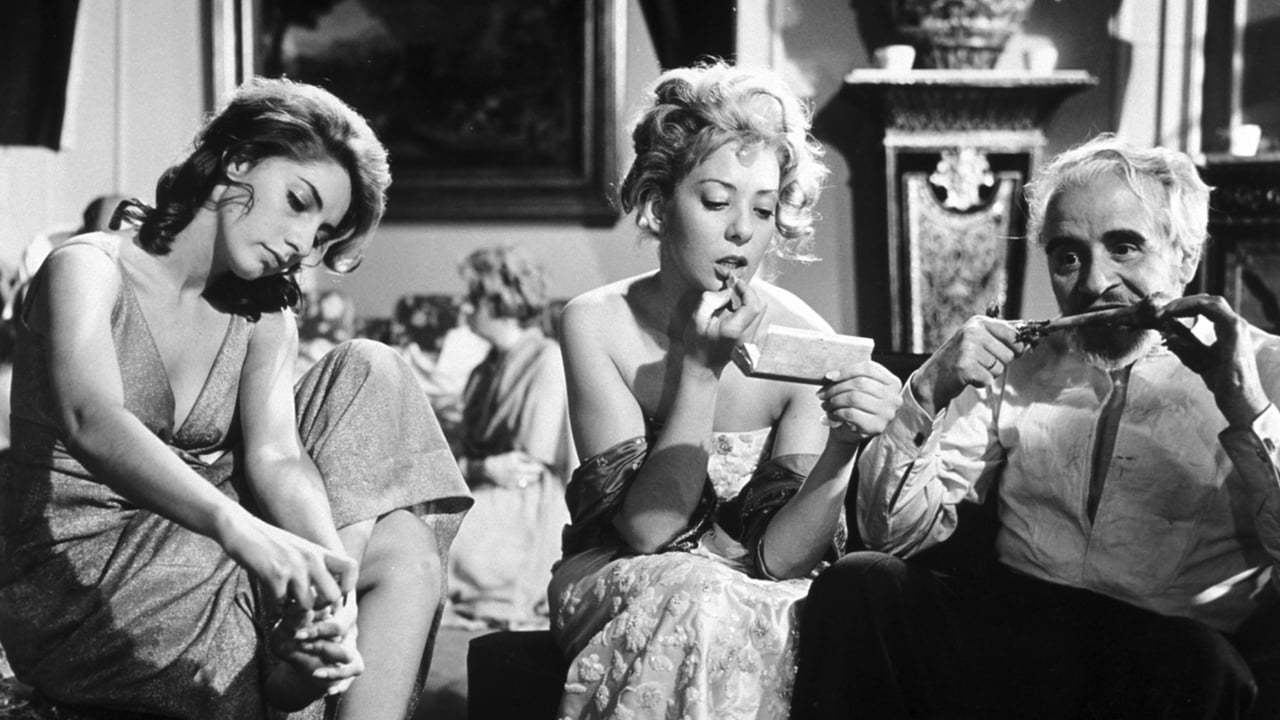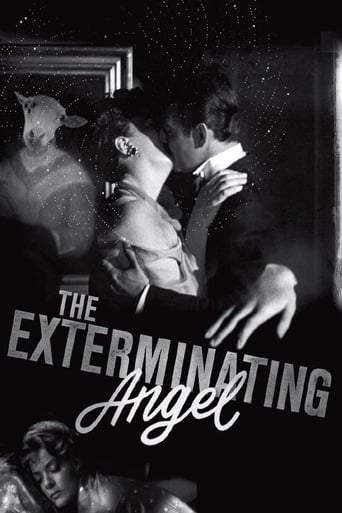

SERIOUSLY. This is what the crap Hollywood still puts out?
... View MoreIt isn't all that great, actually. Really cheesy and very predicable of how certain scenes are gonna turn play out. However, I guess that's the charm of it all, because I would consider this one of my guilty pleasures.
... View MoreIt's a movie as timely as it is provocative and amazingly, for much of its running time, it is weirdly funny.
... View MoreThrough painfully honest and emotional moments, the movie becomes irresistibly relatable
... View MoreMovie which I found by Woody Allen. Movie, that is more ideas than acting and directing. Movie, surrealistic (what a word!) and with this Spanish film director I mark our future goal.I prefer to accept the story as theoretical setting, presenting the bubble of happiness of the rich class in society - the so-called "elite" who never gave up their status and would not admit it to someone lower. Which has amazing, but genteel, tact, dialogue and decency. Elite, whose enemy is his own members.Placed under force majeure circumstances, its representatives are ready to strip the clothing of pretence and show their essence. Before they reach the lowest point in their moral degradation they will go through disregard of age limits or gender differences, violation of art, arrogance, egoism and savagery. Instead of looking for a way to save themselves (understand the world), they stare at each other (like different countries), seeing enemies into each other and are ready to kill each other. In this headlong fall, they quickly recall despicable habits that would attribute to ordinary people's daily needs - they are enjoying the water like champagne. They are able to even eat paper (which I never thought about) indicated by the servant in the film. And what else can be shown in the removing of their elegant shell when they are bored with life, feel inner hate for him, show coldness of empty man, are lost in fashions (e.g. shaving men's legs) and hate the so-called refinement.In such a society salvation find only the dead, lovers, scientists, those who take opium. Outside this society one can be lonely beast, or being an innocent lamb, he immediately would be harnessed to the needs of the elite. This whole farce would not end if eventually they have not reach their greatest meanness, only then the memory of its former heights would rise and to make way for the opportunity to sort out the real worth of the human existence.Perhaps the question why we see this happening is irrelevant. Maybe the right question is how long we will allow to happen?http://vihrenmitevmovies.blogspot.com/
... View MoreIs there any hope for the future of mankind? Fifty years ago, famous Surrealist director Luis Bunuel pointed his acerbic finger at the upper class in this incredibly focused satire of the bourgeois. Such a story as this depends on the audience's ability to look past little details such as a lack of growing facial hair on the men stuck in the living room and accept everything Bunuel throws at us.It seems the most vicious attacks are saved for the Church, which Bunuel seems to view as having similar rules and restrictions as the bourgeois does but with the added promise of eternal salvation in the afterlife. The final sequence of this film is powerful in the way it showcases the bourgeois's almost complete indifference to the struggle and pain of others, even after they have suffered similar conditions. Perhaps the main reason for this film's lasting impact, and the beginning of a whole new career for Bunuel, is its completely unflinching look at what lies at the root of all human beings. In taking away their physical freedom and psychological dressings, Bunuel exposes these people for what he believes we really are: slightly more intelligent, but still animals in every other sense. Our inevitable decline into savagery, incivility and pure selfishness can only be exposed in the most extreme conditions. However, who is to say this isn't possible in some distant future?
... View More'L'enfer c'est les autres' (Hell is other people), wrote the French existentialist philosopher, Jean-Paul Sartre, in his play, 'No Exit' (sometimes referred to - and has been performed - as 'In Camera'), that surmised the narrative of three deceased individuals locked in a room, one that they eventually realise they will be spending eternity together in. Luis Bunuel used this simple meta-narrative concept of people trapped, to create one of his finest satires, and his first explicitly surrealist film since L'Age D'Or (1930). After Bunuel's previous film, Viridiana (1961), was condemned by the Vatican and banned in his native country of Spain (and where it was made), he moved back to Mexico where he had been making films throughout the 1940's and 50's, and produced a scabrous attack on General Francisco Franco's Spanish fascist dictatorship, and the institutions, and bourgeois facets of the country that were founded on the destruction of the poor and the proletariat, during the civil war that ended in 1939.Whilst the film works as political allegory, on a base narrative level, it functions as an irrational comedy; or farce. The guests arrive for a lavish dinner, but as they arrive, the maids leave, and progressively all the hired help leave them. Once dinner is complete, the guests congregate in the living room, but they all begin to realise that they are unable to leave the room at all. When this is discovered we observe that they attempt to go, but are either distracted or simply stop or break down at the boundary of the room. This continues through days, possibly months - the characters concept of time completely obliterated. The group falls into decay, primitive urges overwhelm them, and as this representation of Western Civilisation breaks down, the group become brutally savage, turning on the host of the dinner, demanding sacrifice. The group slaughter the lambs that were originally to be used in a dinner prank.At first the guests seem to simply ignore what is happening to them, and continue with inane chat. Exterior to the "party", the grounds are surrounded, but not even the police are able to enter, given the same mysterious barrier that prevents entry. It's almost a perfect parable, illustrating the ignorance of the Spanish bourgeoisie, as they strip the rights and dignity of the proletariat (here the maids leave on their arrival), whilst divorcing their minds from the violence and corruption of a dictatorship. But with this, it also shows how even the "civilised" sections of society, once they are stripped of their social status, their inherited manners of "education", and their ability to use wealth, the fall into absolute decay, probably falling apart greater than the lower classes, with their lessened moral outlook, and an almost infantile inability to deal with regular obstacles.Winner of the 1962 Palme d'Or at the Cannes film festival, this was to begin what become (rather belatedly for the 62 year old) his most productive, celebrated and interesting period of his career, based in Paris, beginning with Belle de Jour (1967) and ending with That Obscure Object of Desire (1977). This is the period that he developed and expanded his own style, and his unique vision on film. The Exterminating Angel has also given inspiration for others. It is a clear influence on Jean-Luc Godard's wonderfully bleak and satiric depiction of the bourgeoisie and the end of Western Civilisation, Week End (1967). The idea was also utilised in one sketch from Monty Python's Meaning of Life (1983), that saw the guests leaving as ghosts. This is by far, one of his greatest achievements, beautifully realised, with comic touches, and moments of surrealism that both bemuse and amuse.www.the-wrath-of-blog.blogspot.com
... View MoreBunuel's 1962 film revolves (almost literally) around a group of middle-class people at a dinner party. This theme would be explored further in The Discreet Charm of the Bourgeoisie but works better in his earlier piece. The premise of the film is playfully simple. The guests of Nobille are trapped in a room at the end of the evening unwilling or unable to leave. That's it. Until the third reel of the film when the epilogue gives us another context in which to view the previous 80 minutes worth of action.The characters are placed within this Kafkaesque narrative, seemingly of their own accord at first. There is no barrier to the next room yet no one can pass its borders. There is no science-fiction at play here, more an existential angst keeping them from what lies beyond. Some of the players half-heartedly try and make their escape but some give-up without trying or stall at the last, crying, unable to move further. Their predicament is not one of comfort either, there is death, starvation and thirst within the group and their ordeal goes on for weeks. Occasionally Bunuel brings the audience out of the room and we see people on the outside staring at the house with as much perplexity as those trapped inside. A rescue attempt is made but again, no one really tries to just walk in, open the doors and let the poor wretches out.What are we to make of the situation. Obviously there is a metaphor that Bunuel wants us to read. Is it a simple case of the middle classes being trapped within their own understanding of the world, with the desire to understand other kinds of people merely an act of lip-service to their supposed ideals? Is it a comment on the Spanish Civil War whereby those on the streets were forced to fight as the middle classes ate their lamb? The ending reveals more than I will say but I think this is Bunuel's best film of those I've seen and it is a crisp, timeless watch which asks more questions than it answers.
... View More